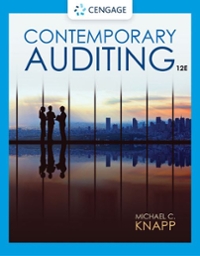Question
Accounting for Contingencies and Provisions In accounting, contingencies and provisions play a crucial role in preparing financial statements and ensuring accurate representation of a company's
Accounting for Contingencies and Provisions
In accounting, contingencies and provisions play a crucial role in preparing financial statements and ensuring accurate representation of a company's financial health. Contingencies are uncertainties that may or may not occur, and their resolution depends on future events. Provisions, on the other hand, are liabilities that are recognized when there is a probable future outflow of economic benefits and the amount can be reliably estimated.
Paragraph 1: Understanding Contingencies
Contingencies are events or situations with an uncertain outcome that may impact a company's financial position. These can include legal disputes, environmental issues, or potential warranty claims. Accountants must evaluate the likelihood of these contingencies occurring and estimate their financial impact. If it is probable and the amount can be reasonably estimated, a contingent liability is recognized in the financial statements.
Paragraph 2: Provisions and Future Liabilities
Provisions are established to account for future liabilities that are likely to occur. They are recognized when there is a legal or constructive obligation, resulting from past events, and it is probable that an outflow of resources will be required to settle the obligation. Provisions can encompass a range of scenarios, such as restructuring costs, warranties, or environmental cleanup. Accurate estimation of the provision is essential to reflect the true financial position of the company.
Paragraph 3: Importance in Financial Reporting
Accounting for contingencies and provisions is vital for transparent financial reporting. Investors and stakeholders rely on financial statements to make informed decisions. Properly accounting for potential liabilities ensures that financial statements accurately represent the company's financial position, reducing the risk of misleading information. It also allows for better risk management and strategic planning as companies assess potential future financial impacts.
Objective Type Question:
What is the key difference between contingencies and provisions in accounting?
A) Contingencies are certain future liabilities, while provisions are uncertain events. B) Contingencies are recognized only when the amount is certain, while provisions are recognized for uncertain events. C) Contingencies are uncertainties with an unknown impact, while provisions are recognized for probable future liabilities with a reliable estimate. D) Contingencies and provisions are interchangeable terms in accounting.
Please select the correct option and provide a brief explanation for your choice
Step by Step Solution
There are 3 Steps involved in it
Step: 1
The correct answer is option C Contingencies are uncertainties with an unknown impact while provisio...
Get Instant Access to Expert-Tailored Solutions
See step-by-step solutions with expert insights and AI powered tools for academic success
Step: 2

Step: 3

Ace Your Homework with AI
Get the answers you need in no time with our AI-driven, step-by-step assistance
Get Started


